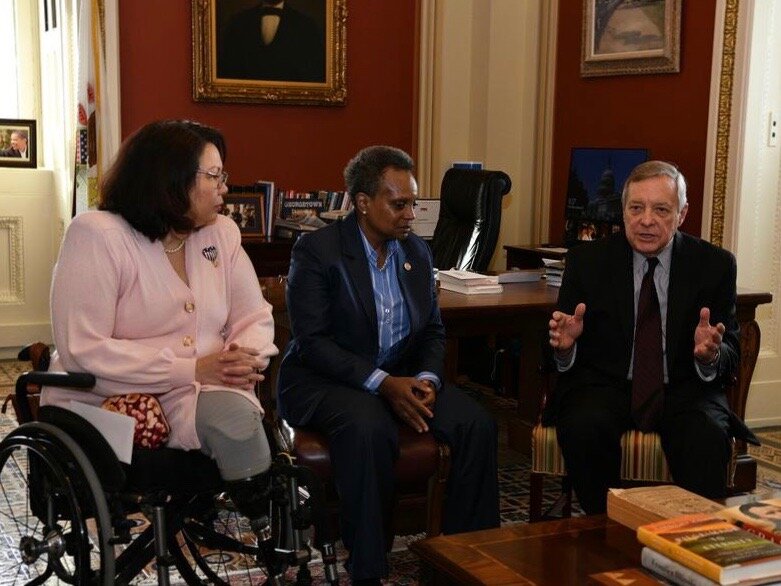Duckworth, Durbin urge benefits for gig workers
Senators call out labor secretary for ‘narrow, ambiguous’ interpretation of COVID-19 relief bills
U.S. Sens. Tammy Duckworth and Dick Durbin flank Chicago Mayor Lori Lightfoot in a meeting with Illinois mayors held in Washington, D.C., earlier this year. (Sen. Dick Durbin)
By Ted Cox
Illinois’s two U.S. senators have joined in calling out the Trump administration’s labor secretary for “narrow or ambiguous” interpretations of coronavirus relief bills that are serving to deny benefits for gig workers and others idled by the pandemic.
U.S. Sens. Tammy Duckworth and Dick Durbin joined dozens of their Democratic colleagues in the Senate this week in sending a letter to Labor Secretary Eugene Scalia charging that guidance he’s issued on relief bills “could make states think they need to exclude workers who Congress clearly intended to receive unemployment compensation through the Pandemic Unemployment Assistance program.”
The letter specifically cites ride-share drivers and independent contractors who have lost clients through the economic shutdown resulting from the pandemic. It says the Labor Department “must clarify that an independent contractor who is unable to work and forced to suspend work activities because there is reduced demand for their services also qualifies for PUA benefits.” It adds that ride-share drivers “should be able to claim PUA when they are forced to suspend their work because there are too few customers seeking rides,” while “for an independent contractor, losing many or all of their customers overnight is analogous to an employee being laid off by an employer.”
It also criticizes Scalia for attempting to limit benefits for school closings to the school year. It cites language in one of the relief bills stating that benefits are in order if “a child or other person in the household for which the individual has primary caregiving responsibility is unable to attend school or another facility that is closed as a direct result of the COVID–19 public health emergency and such school or facility care is required for the individual to work.” Scalia attempted to issue guidance stating that benefits are not applicable “after the date the school year was originally scheduled to end,” but the letter points out that the law specifically included “school or another facility,” meaning day camps and other forms of child care parents draw on during summer vacation.
Scalia, a corporate lawyer and son of the conservative U.S. Supreme Court Justice Antonin Scalia, who died in 2016, has made no secret of his resistance to unemployment benefits. He wrote an article last week, published online by Fox Business, stating that “unemployment is not the preferred outcome when government stay-at-home orders force temporary business shutdowns,” and “we want workers to have work, not to become dependent on the unemployment system.”
The Washington Post published an article Friday charging that Scalia “has used his department’s authority over new laws enacted by Congress to limit who qualifies for joblessness assistance and to make it easier for small businesses not to pay family-leave benefits.”
The senators’ letter concluded by urging Scalia to “respond to questions from states as quickly as possible to avoid causing any delay in the processing of benefits.”
On Monday at his daily coronavirus briefing, Gov. Pritzker also accused the Labor Department of causing confusion in how coronavirus relief is being applied to workers, but he emphasized that Illinois would be processing unemployment benefits for so-called 1099 workers, who aren’t salaried employees, through a separate system under development. Pritzker said federal funding for the expanded unemployment benefits wasn’t expected until May, and that he expected so-called gig workers who apply for unemployment to receive their first benefits the week of May 11.

